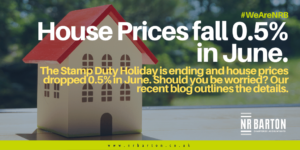As the stamp duty holiday is ending, it is interesting to look at the effects which this has had on house prices across the UK. The holiday was introduced on 8 July 2020 after concerns were raised regarding the property market after coming out of the pandemic.
This scheme increased the number of people that were looking to buy a home and caused the average house price to increase across the UK. However, as the period is ending, the average house price fell by 0.5% throughout the month of June. This has caused many people to express concerns about the future of the housing market as we come out of lockdown and move towards ‘Freedom Day’.
However, the holiday caused house prices to rise by 8.8% which means, despite the slight fall in June, prices remain more than £21,000 higher than they were before the scheme started. This information is important as it helps to put June’s small pricing fall into context and emphasise that there is no real cause for concern at this moment.
According to Halifax, the average price of a house in the UK is now £260,358 but demand remains especially high among buyers searching for larger family homes; the average price of detached homes is now more than half a million pounds, over £200,000 higher than that of an average semi-detached house. This desire for larger, more spacious housing has led to an increased willingness to spend a higher proportion of income on housing. Another reason for the price increase is that buyers have an increased level of purchasing power due to cheap borrowing and how simple it is to gain access to it.
It is predicted that annual growth will slow more by the end of the year, with unemployment expected to edge higher as job support measures unwind, and the peak of buyer demand now likely to have passed. However, there are no clear signs that there is going to be any form of housing market crash. Although the stamp duty holiday causing the nil rate band to be £500,000 ended on 30 June, you can still take advantage of the £250,000 nil rate band up to 30 September 2021. After this point, the nil rate band will return to £125,000.
If you have any questions about the content in this article please contact your usual Partner or Manager, or call us on 10942 242 245, and we will be happy to help.




